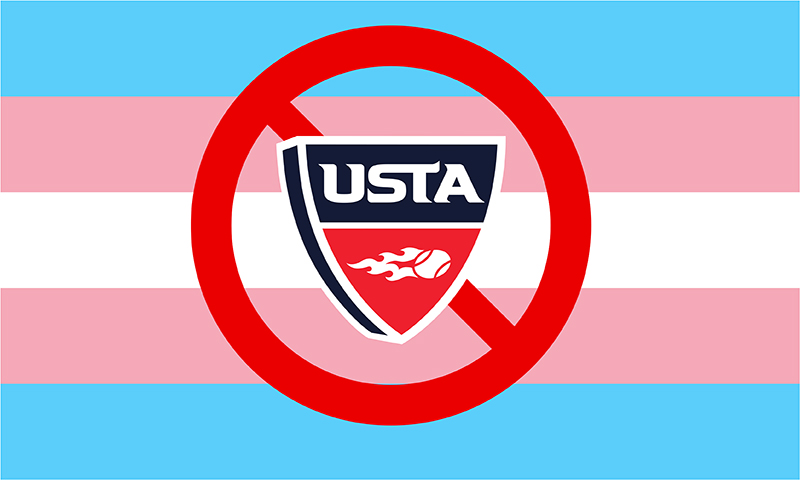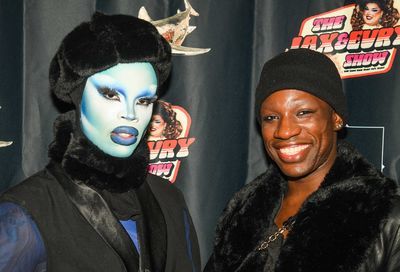School Investigated Athlete’s Gender After Her Competitors Complained
LGBTQ advocates had predicted that Utah's anti-transgender sports bans would be weaponized against cisgender female athletes.

A Utah school reportedly investigated a female athlete’s gender identity after she defeated two other girls by such a wide margin that it prompted their parents to question whether she is transgender.
School officials never informed the student or her parents about the probe in order “to keep the matter private,” David Spatafore, the spokesperson for the Utah High School Activities Association, which oversees and regulates athletic events in the state, said during a legislative hearing on transgender athletes on Wednesday.
In the athletic competition, the girl outmatched her fellow competitors by such a wide margin that it aroused suspicion that she might be transgender. The parents of her rivals filed a complaint, launching an investigation into her gender. The school then looked into the student-athlete’s record and found she is registered as female.
But rather than be satisfied, the UHSAA demanded that the school dig deeper into the student’s middle and elementary school records, reports the Salt Lake Tribune.
“The school went back to kindergarten, and she’d always been a female,” Spatafore said. He added that if someone has been a female since kindergarten, it’s likely they aren’t transgender and didn’t transition.
When pressed by reporters, Spatafore refused to reveal the winning student’s grade, school or the sports she plays, in order to protect her identity.
He added the UHSAA never informed the girl or her parents of the investigation in order to protect her from potential embarrassment and humiliation.
“If all of the questions about eligibility were answered by the school or the feeder system schools, there was no reason to make it a personal situation with a family or that athlete,” Spatafore told the Tribune.
The incident underscores one of the potential ramifications of a law Utah lawmakers passed earlier this year barring transgender athletes from competing based on their gender identity.
At the time, the proposed law’s opponents had predicted that any ban on transgender athletes would be weaponized against cisgender female athletes — especially those that don’t adhere to rigid gender stereotypes or have more muscular bodies — who would be accused of being transgender, and potentially sidelined from competitions, out of jealousy, spite, or malice on the part of opposing teams.
The fact that the student in question and her parents were never informed also revealed how far the UHSAA will go when investigating complaints alleging violations of the new law.
Sue Robbins, a member of the Transgender Advisory Council of Equality Utah, said the investigation into the student’s gender identity underscores the need for a written policy on when and how such investigations will be conducted.
“Where does the UHSAA get their authority to go investigate? Where is it in their policy?” she asked. “If they’re going to examine a level of records without telling the athlete, they should have a policy behind it. Otherwise, what constrains their behavior?”
“We warned about this being a possibility, that everyone would accuse everyone who is successful of being transgender,” Robbins added, referring to opponents’ predictions on how the law would be weaponized if passed. “It becomes about judging women’s bodies. And no body is safe.”
When confronted with the story on Thursday during his monthly news conference, Utah Gov. Spencer Cox, a Republican, said: “My goodness, we’re living in this world where we’ve become sore losers, and we’re looking for any reason why our kid lost.”
“I have a real problem with that story,” added Cox. “I just wish we could be a little more thoughtful in life and a little less critical of other people.”
Cox had originally vetoed the transgender sports ban, only to have lawmakers — primarily fellow Republicans — override his veto. He added that while he appreciates fostering fairness in sports, “making up allegations like that are pretty disturbing to me.”
Cox also said parents, including himself, can get overly involved when their kids are competing. But he felt the complaint against this particular student crossed a line.
The complaint was filed last year, when the UHSAA had a different policy on transgender participation. Under that old policy, transgender athletes were required to register as transgender and have received puberty blockers for more than a year before becoming eligible to compete on teams matching their gender identity.
Spatafore said many parents have raised complaints, accusing some of their children’s competitors of being transgender. But none of those complaints were found to be verified. In fact, the state had only one registered transgender female athlete competing on a girls’ team during the last school year.
Utah’s investigation comes as lawmakers in 18 states have passed laws restricting transgender students to playing on sports teams that match their assigned sex at birth only, in the name of ensuring “fairness” for cisgender females, who they argue are at a biological disadvantage when forced to compete against trans athletes. Lawmakers in several states have also sought to pass other laws restricting LGBTQ rights by attempting to gag teachers and students from speaking about LGBTQ issues in class, or by barring them from accessing gender-affirming health care treatments.
Utah’s ban on transgender athletes is currently being challenged in court by three transgender students who wish to play on girls’ sports teams. Under a provision in the law, if a judge issues an injunction blocking the ban from being enforced, transgender students will be referred to a seven-person commission, which will determine an athlete’s eligibility.
The commission will take into account a player’s physical attributes, including wingspan, weight, and height; whether a student is receiving puberty blockers or hormones; and whether allowing them to compete would present a “safety risk to the student or others” or give them “a material competitive advantage when compared to students of the same age.”
Support Metro Weekly’s Journalism
These are challenging times for news organizations. And yet it’s crucial we stay active and provide vital resources and information to both our local readers and the world. So won’t you please take a moment and consider supporting Metro Weekly with a membership? For as little as $5 a month, you can help ensure Metro Weekly magazine and MetroWeekly.com remain free, viable resources as we provide the best, most diverse, culturally-resonant LGBTQ coverage in both the D.C. region and around the world. Memberships come with exclusive perks and discounts, your own personal digital delivery of each week’s magazine (and an archive), access to our Member's Lounge when it launches this fall, and exclusive members-only items like Metro Weekly Membership Mugs and Tote Bags! Check out all our membership levels here and please join us today!




























You must be logged in to post a comment.